WATCH > Mark Adams in conversation with Maria MacNamara
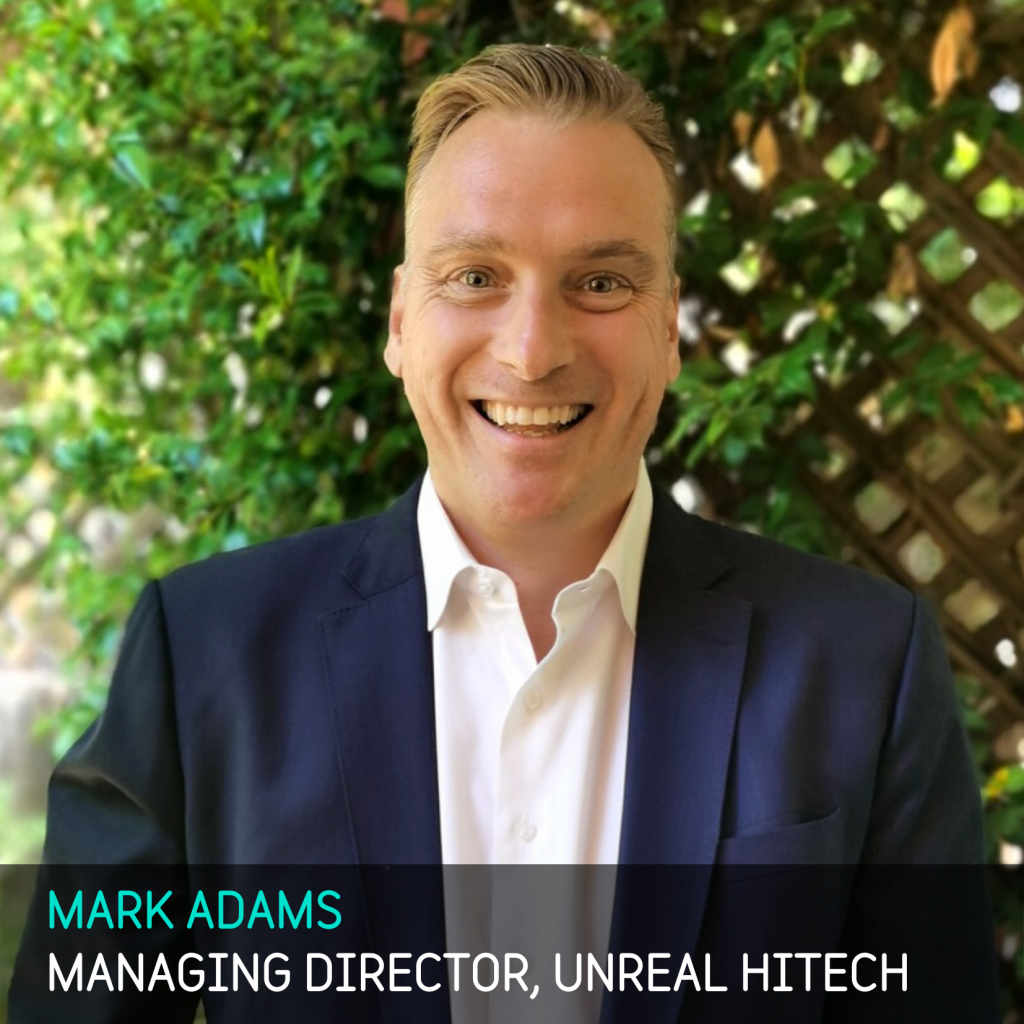
Mark Adams is an Australian in the Bay Area. He is the managing director of UnReal HiTech, and hosts the podcast ‘Recruiting Reimagined’ presented by Curious Thing AI. In this conversation with Advance.org CEO Maria MacNamara, he talks about his entrepreneurial journey to Silicon Valley, how technology is helping the global jobs market in rebounding the economy, and his interest in promoting Australia’s technology potential.
A self-made global entrepreneur
Mark has a deep interest in the future of work and recruiting, with a particular focus on artificial intelligence and how the intersection of the two elements will impact our careers over the next 20 years. Mark began his journey at the age of eight, when he traveled overseas for the first time and immediately knew that was what he wanted to do.
“Ever since then I wanted to work in Hong Kong. At the point of 10-15 years into my career, I got the chance to work with a startup. The concept of being an entrepreneur was really intriguing, because I didn’t know anything about it. I took the leap of faith and moved to Hong Kong with a company that had most of their employees in Sweden.”
These days, an Australian in Hong Kong working for a Swedish company is just how the world works. Back then, the scene cemented Mark’s love of watching things grow, of technology, and of seeing Australia’s engagement with the Asia-Pacific region. The experience gave him a sense of East and West, and he learned first hand how Asia reacts to Europe and to the United States. He recalls “I was in Hong Kong for many years, working with the Government quite closely to build the business there. We grew the business, and as a result I moved to the USA to run its operations. It was essentially working for streaming companies to build their apps, so nearly ten years ago now it was a great time to be in that business.”
Mark launched the operation in a new location, and went to expand globally. The experience gave him a real taste for growth and the excitement of building something from nothing. Soon he met Australian entrepreneur Co-Founder and CSO of Curious Thing David McKeague, and they ended up working together and with Australian investors. Mark says “Along the way I realised that this is what I want to be doing. I don’t have anything against large companies, but I don’t think they would have me at this point -I am too much of an independent entrepreneur. Of course I thought about what I want to do over the next 30-40 years, and then I started a consulting business which helps companies to enter the USA market.”
Talent is key to recovery
Successful organisations are growing fast these days, and have a new problem: finding the right people and being able to attract talent from anywhere. Automation of the recruitment process works really well in high volume recruiting scenarios, and Mark believes artificial intelligence is not going to replace the judgment of a recruiter or a human being, which means the human should be focused on engaging with candidates and moving them through the process.
The automation can be employed to cast a net widely, to give everyone an even opportunity to apply for a role, to be assessed fairly in a way that completely respects diversity. Then with that data, the technology allows the recruiter to make the judgment about who to carry forward.
Mark talks about the technology that is being used to help HR teams ensure the recruiting process remains relevant for high volume roles. “A client is recruiting 25,000 people in the next 60 days. This is for one of the biggest industries in the USA, call centres. A lot of those people don’t have resumes, or can’t make an appointment during business hours, but now they are given an opportunity to do the call at 9pm after their kids are in bed and have a conversation that captures their strengths and adds more dimension -rather than being simply dot points on a resume. That is what Curious Thing technology does, we drive the volume. That technology was invented in Australia, and I am very proud of it.”
Ideas from anywhere – the battle to beat the best
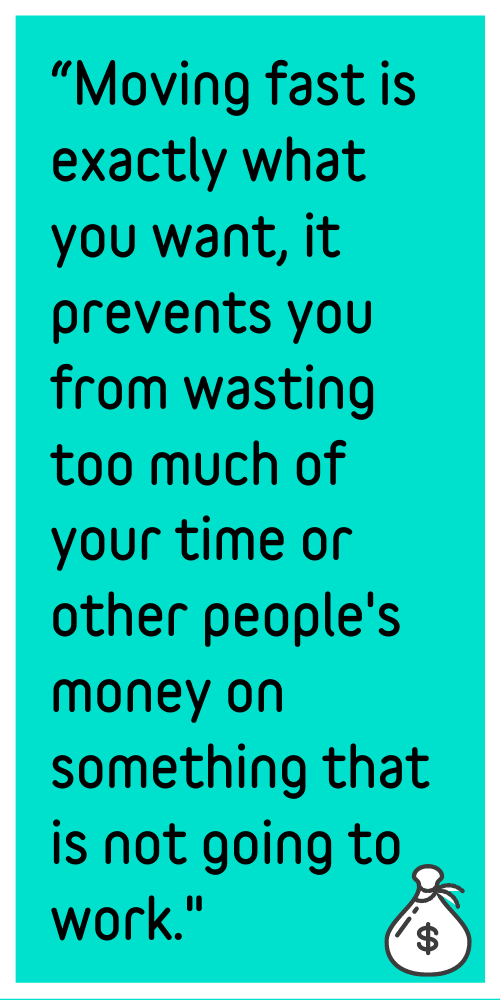
Mark thinks that the many Australians are unprepared for the culture shock they experience entering the United States for the first time so far into the current cycle. He thinks the difference is even more acute than entering the Hong Kong market. This is because the United States has a much more complex, less stable environment in his view -which is ideal for an entrepreneur to thrive. Mark says “The one thing I love about the USA is that they welcome anyone in and will talk to you about an idea or have you sell them the knowledge. As an Australian coming here without much of a network, the fact that I was able to go into some of the biggest Fortune 500 companies, do deals, build a network, is a testament to how open they are about ideas from anywhere.”
Mark observes this is part of the strength of the American market. The underlying self confidence that Americans have, gives them a platform to embrace things from all over the world, because they are one of the most culturally diverse places on the planet. In contrast, he believes that Australia is still more conservative, with less of a willingness to take risk, because there is a sense of having too much to lose. Mark says “We haven’t had to take the risks, we have been very lucky with the way our economy and our society is structured. There have been really stable career paths and for a long time we were isolated and only now we have become more open. While in the USA, that sense of aggressive competition has 50 states competing with each other for investment dollars, to relocate companies…and underneath the states there are the counties.”
Mark believes that the complexity of the system breeds competition, and acts like a magnet for the best from around the world. He explains that in an environment like Silicon Valley, the notion of moving fast is extremely intense, and the idea of failing turns into the notion of growing as an entrepreneur and learning to be a better leader. That is why Mark thinks it is really important for Australian companies to get to the USA: to become a global business, test the market, and get feedback.
“Moving fast is exactly what you want, it prevents you from wasting too much of your time or other people’s money on something that is not going to work. You will find people here that you can talk to, who are open to giving feedback and tell you if your product will work or not – from corporates, down to small or medium enterprises, to investors, to other users. You can ignore that advice, keep going and be successful regardless. Because any success in the entrepreneurial game means you are an outlier, especially if you become a company like Canva or Atlassian. So any startup here is always on the way up, not only because it potentially ignored or saw things, but because it will get traction very quickly.”
Made in Australia
Mark believes that companies are continuing to do their high value research and development in the USA, because they have the right number of clustered PhDs, computer scientists and computational linguistics. He says “They keep coming here from around the world, even though now that has potentially slowed down and is causing people to rethink all things. With the H1B workers scheme suspended temporarily, there are deeper questions on why we need to import so much talent. The truth is some of the greatest companies have been founded by people on those visas.”
The winds of change are blowing. Mark sees Australia being raised in conversations about deep tech product development. He believes Australia is attractive because of the stability, the exchange rate, and because it is the shiny new thing: there are many people who do not know its capacity or capability. He says this is the real opportunity over the next 5-10 years, and wants Australia to signal its advantages now, while the window of opportunity is open.
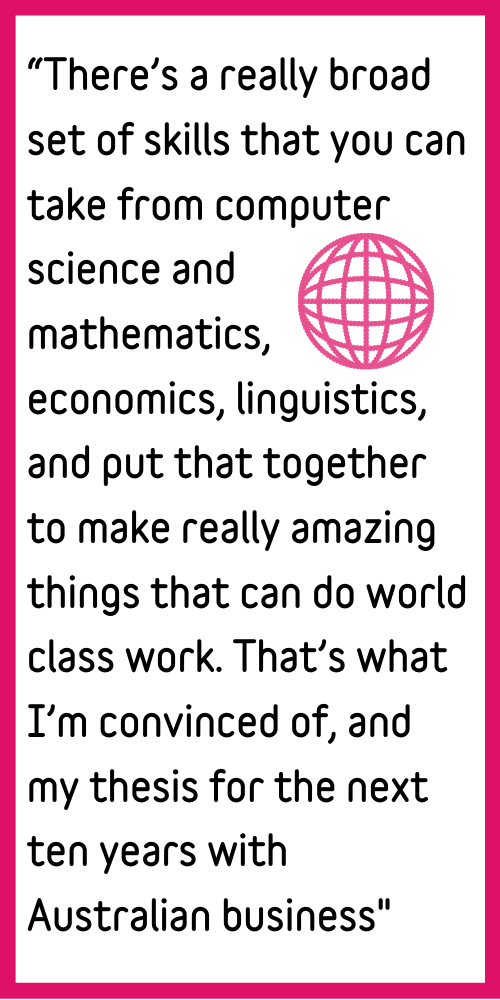
“Once people do figure that out, plus they figure out there’s a bunch of really smart people, and some really smart R&D, then that’s going to be huge for us. I think about the top 50 companies, are going to spend USD400 billion on R&D this year. But under that there’s probably another USD500billion all the way down the list of people, hundreds of different companies with really interesting projects that they might not be able to staff in their home counties. Especially in the US, mid tier companies (a mid-tier company here is like a USD3-5 billion company up to a USD10billion), if they were made aware of what we can do for them, if Australia branded itself well around specific skill sets then that I think is really huge,” Mark says.
He adds “It’s not going to replace $200 billion worth of trade with China overnight, but year by year, if we can grab 0.1% of that global R&D, then 1% of that, it has 2 really good effects. Number one, we get exposure and deep integration into the global and especially the US supply chain. Number two, it actually trains the next generation of product leaders so they get exposure without leaving Sydney or Brisbane or Melbourne to this global workforce, or this global workflow. Then from there they get to go and hopefully start their own companies and get inspired to do something entrepreneurial, but they’re getting first class exposure and training. That’s the thing over the next 5-10 years that’s a real opportunity, I think things will be volatile from now till forever, and they always have been, but I think Australia has been an oasis of calm and stability, but with huge advantages. I know we’ve been shouting about them, here it feels like a whisper. So much more we could do.”
In the competition to attract global R&D, Covid-19 has given Australia a brand new opportunity. With our curve under control, this is one of the safest places on the planet for teams to exist without being infected. A company that values its product team can relocate them to Australia with all the natural advantages the country offers, in addition to the safety and security of its most important assets, its product development team.
Mark reflects on the fact that Australia is one of the most stable countries in the world. “When I say R&D as well, it’s not the deep science in the lab, it’s really just run of the mill product development, the next generation and iteration of product. And that to me is super exciting, we have great R&D centres in our universities, that’s very well known in those circles, but the fact that we can translate that into products, and be commercially focused and execute on it is the next step there, and that’s really going to be amazing for us. The parallels with Montreal and Toronto and Israel, they’ve really done well at branding themselves around specific verticals. We can do that as well. We don’t want to take it all on and there’s no reason we should, but we have the capacity to go deep in a certain number of areas. I’m sure there’s many more but i think about our, there’s 5,000 computer science students right now at UNSW, all churning away. There’s a really broad set of skills that you can take from computer science and mathematics, economics, linguistics, and put that together to make really amazing things that can do world class work. That’s what I’m convinced of, and my thesis for the next ten years with Australian business,” says Mark.
There is an added benefit with 300,000 of the one million Australians living and working overseas returning home since the start of the pandemic as reported by DFAT recently. We have met so many of them at Advance.org and it is clear to us that they are professionals who have been working at the cutting edge globally, and have come back for a number of reasons, including the impact of COVID-19 on their lives.
Global companies now have access to the very same quality of talent they have in their home countries, in a safe, healthy, secure and thriving ecosystem in Australia. Add to that the benefit of them working in different time zones and you open up a 24/7 work cycle which provides a tremendous competitive advantage.
Australia as a global product development hub
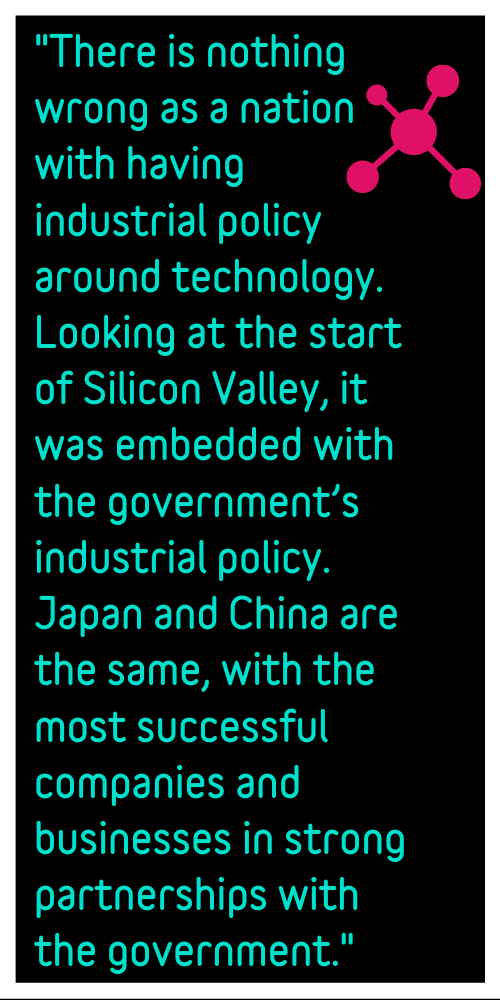
Mark thinks that to attract product development investment to Australia, government needs to create the environment and then let the private sector do what it does best. “In many cases it is just either getting out of the way, or creating the right set of conditions from a taxation and legal perspective and all the things that governments do best. There is nothing wrong as a nation with having industrial policy around technology. Looking at the start of Silicon Valley, it was embedded with the government’s industrial policy. Japan and China are the same, with the most successful companies and businesses in strong partnerships with the government.”
Mark recognises that the one thing any entrepreneur today needs is access to talent. He says “businesses now are people businesses, they live or die by the quality of people.” He also says that having a decent cost base is critical. There’s great appeal in the fact that Sydney is investing in the new precinct at Eveleigh with partners like Atlassian and UTS. Mark observes that another opportunity in Australia is that work is more concentrated. He observes “America is more diverse and spread out.” There is a recognition that you can have a presence in Sydney and the regional areas of Australia as well as the Brisbane to Gold Coast corridors. Mark observes that “there are great universities and a great lifestyle”.
He looks forward to returning to Australia and building his next successful company. He has been away for over 14 years and feels he will face many of the challenges of any immigrant entering a new place. Despite that, Mark thinks his transition will be simpler because he has been lucky: as the CEO of an Australian company, he has been periodically returning to Australia and knows what to look for as an entrepreneur who wants to succeed in the country.
While his customer base will always be in the United States, he is delighted to hear that there is an increasing highly skilled population of Australians that has come back with that “global mindset and experience” and used to working at the pace, intensity and level of competition of the American, European or Asian markets.
Shaping the next generation
Mark sees opportunities for current students impacted by the pandemic. He thinks many will definitely have to shift their focus from careers they had anticipated pursuing, and “get the first pivot out of the way early”. Mark observes that “we need to move away from the idea of people dying relatively young and retiring at 65. We need to start thinking that we are going to have not just one career, but five 10-year careers or ten 5-year careers. It is going to be about constantly pivoting, reskilling and learning. We need to get used to it, because that is what is going to keep happening for the next half century, if not longer. The next generation might live to 100 years, so the way they would think about their careers and life will be in such longer terms that the time frames will be completely different.”
“And yes, we might be looking at a short term pivot now because of Covid, but there will be another ten pandemics and recessions in the next decades to come. We need to embrace it because that is how it is going to be. Even now, it does not matter if we have a 50-year or 20-year career, what we learned at university will be obsolete fairly quickly. Circumstances, economy and environment are all going to change and we have to aggressively stay in front of them.”
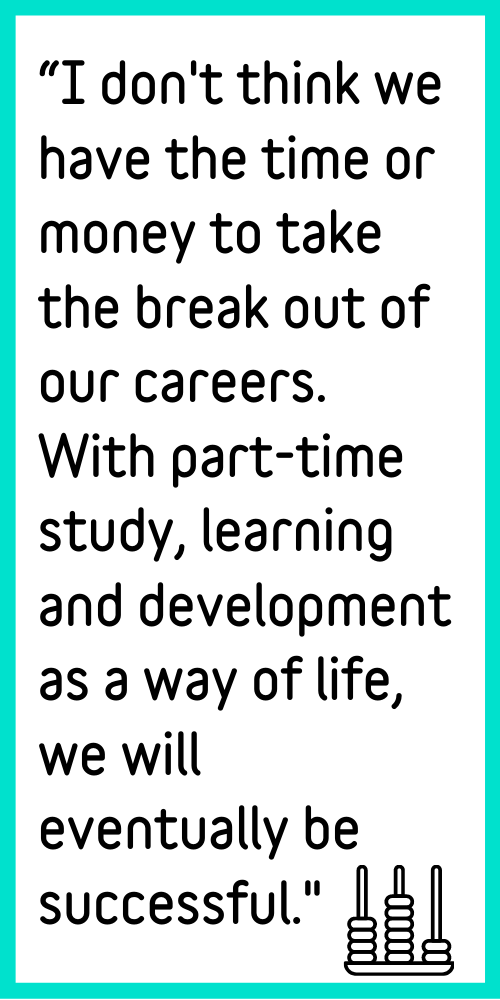
Mark is passionate about the huge opportunities in machines and AI taking some jobs. They create a continuous state of flux of skills, of jobs that did not exist five years ago and will not exist in five years time. He sees a constant need to reinvent and reskill. While the traditional route of reskilling is going back to university for a degree, he thinks that a great deal of reskilling has to be self motivated.
“I don’t think we have the time or money to take the break out of our careers. With part-time study, learning and development as a way of life, we will eventually be successful. It has to be ingrained in the way we operate, because that is how companies need to think as well. They end up having to make 2,000 or 5,000 people redundant because they were surplus to business requirements. So what are we going to do about it? Are we going to go through the expense of retrenching, rehiring, retraining, or are we just going to embed that into our operating plan? We need to keep reinventing our people because we cannot change a company without changing the people. People have to keep growing to grow a company”, says Mark.
The need of constant learning makes the ability of new recruiting tools fundamental. It is needed a far more sophisticated tool to analyse whether the capability of a person matches a role. Mark believes the HR tech tools help not just in the recruiting aspect, but once staff are on board they also help with the whole employee lifecycle.
Mark believes “You need to keep checking in with them because they might come on board perfectly and ticking all the boxes on day one, but by year 3 they are at a point where they have fallen behind. Through no fault of their own, they have just been doing their jobs. That constant appraisal of where you need to be and the skills gaps, that all needs to be part of what HR departments and people operations are thinking out of as well. Reapplying yourself for each role throughout your career works both ways as well: companies should keep rehiring the same people, people should keep being re-employed, and those create the opportunities that we love.”
Further information
RESOURCES
> Watch the interview
> Read the transcript
> About Curious Thing Ai
> Invest Hong Kong
> Tech Central in NSW
ABOUT
Mark Adams is a Business Developer for Curious Thing AI and Managing Director of UnReal HiTech. He also hosts the podcast ‘Recruiting Reimagined’ presented by Curious Thing, where he interviews leaders in the human capital system and focuses on culture, talent, mental health, labor force analytics and technology. He is interested in the future of work, recruiting, and how AI will impact our careers over the next 20 years. Through Curious Thing AI, he promotes automated, voice-based AI interviews, and an advanced people analytics platform to interview candidates at scale. Mark is a truly born global Australian, having worked in Australia, the United Kingdom, Hong Kong and the United States.